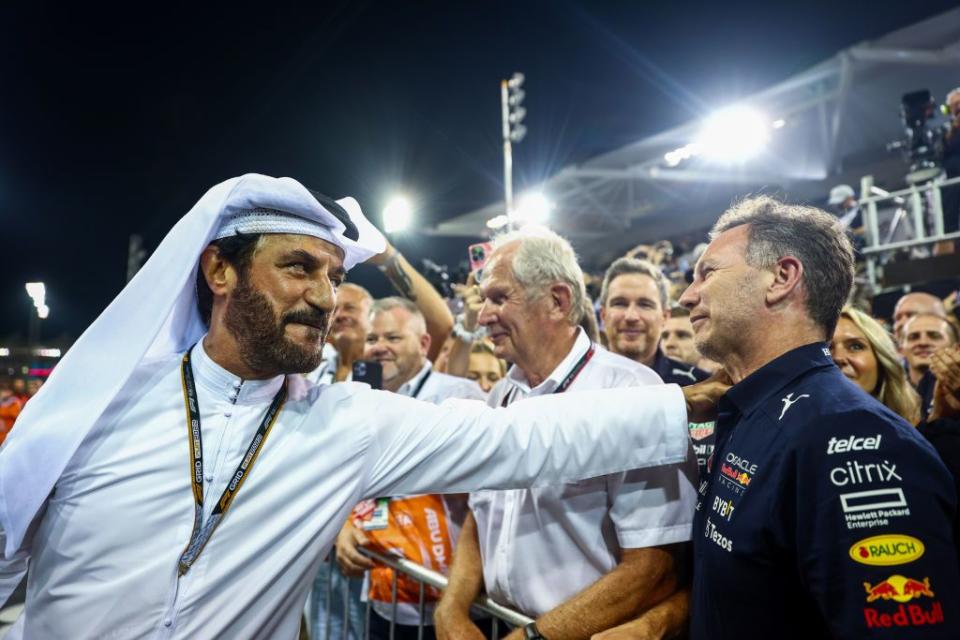Saudi Arabia Public Investment Fund that Started LIV Golf Tour Targeting Formula 1

Media reports are suggesting that Saudi Arabia, through its Public Investment Fund, has attempted to buy Formula 1 for $20 billion.
Liberty Media acquired Formula 1 in 2017 in a deal valued at $8 billion—once debt was taken into account.
FIA president Mohammed Ben Sulayem upset some in F1 when tweeted on Monday that “as the custodians of motorsport, the FIA, as a non-profit organization, is cautious about alleged inflated price tags of $20 billion being put on F1."
Formula 1 has rebuked FIA President Mohammed Ben Sulayem over comments he made on his personal Twitter account concerning the championship’s value.
Ben Sulayem was reacting to a report which emerged on Bloomberg suggesting that Saudi Arabia, through its Public Investment Fund, had attempted to buy Formula 1 for $20 billion.
The FIA leased the commercial rights to Formula 1 under a 100-year lease in an agreement signed in 2001, when Bernie Ecclestone fronted the championship. Liberty Media acquired Formula 1 in 2017 in a deal valued at $8 billion—once debt was taken into account—and the championship’s presence has since grown on the global stage.

While Public Investment Fund has expanded its sports portfolio in recent years to include among others the LIV Golf Tour, English soccer team Newcastle United and a stake in Formula 1 through the Saudi Arabian Grand Prix and state fuel company Aramco—a partner of Formula 1 and a title sponsor of the Aston Martin team—it is understood that it has not totally given up its bid to buy Formula 1.
Ben Sulayem tweeted on Monday that “as the custodians of motorsport, the FIA, as a non-profit organization, is cautious about alleged inflated price tags of $20 billion being put on F1.
“Any potential buyer is advised to apply common sense, consider the greater good of the sport and come with a clear, sustainable plan—not just a lot of money.
“It is our duty to consider what the future impact will be for promoters in terms of increased hosting fees and other commercial costs, and any adverse impact that it could have on fans.”
As the custodians of motorsport, the FIA, as a non-profit organisation, is cautious about alleged inflated price tags of $20bn being put on F1. (1/3)
— Mohammed Ben Sulayem (@Ben_Sulayem) January 23, 2023
Any potential buyer is advised to apply common sense, consider the greater good of the sport and come with a clear, sustainable plan – not just a lot of money. (2/3)
— Mohammed Ben Sulayem (@Ben_Sulayem) January 23, 2023
It is our duty to consider what the future impact will be for promoters in terms of increased hosting fees and other commercial costs, and any adverse impact that it could have on fans. (3/3)
— Mohammed Ben Sulayem (@Ben_Sulayem) January 23, 2023
Ben Sulayem’s public comments were universally not well received by Formula 1, which has now sent him a letter, authored by its legal executives. In the letter, first reported by Sky Sports and verified by Autoweek, it outlines that ‘the FIA has given unequivocal undertakings that it will not do anything to prejudice the ownership, management and/or exploitation of those (commercial) rights.’
‘We consider that those comments, made from the FIA president's official social media account, interfere with those rights in an unacceptable manner.’
The letter goes on to state that ‘any individual or organization commenting on the value of a listed entity or its subsidiaries, especially claiming or implying possession of inside knowledge while doing so, risks causing substantial damage to the shareholders and investors of that entity, not to mention potential exposure to serious regulatory consequences.’
It adds that the FIA "may be liable" if Formula 1’s value is damaged and asserted that it should not be necessary for the issue to be protracted further.
It is the latest flashpoint between Formula 1 and the FIA since Ben Sulayem was voted in as president of the governing body in December 2021. There were disagreements in 2022 over the financial implications of expanding the Sprint format, Formula 1 was frustrated that Ben Sulayem delayed sign-off on the 2026 engine regulations, while Ben Sulayem has adopted a positive tone on Andretti-Cadillac’s prospective entry compared to Formula 1’s lukewarm reaction.
Formula 1 teams have also been frustrated at some of Ben Sulayem’s interference on matters not directly concerning him—in contrast to the approach of predecessor Jean Todt—with his comments on Twitter the latest, and very public, example.

 Yahoo Autos
Yahoo Autos 